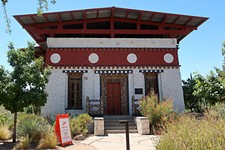Day Trips
The Buddy Holly Center in Lubbock is home to a tribute to one of Texas’ favorite sons and also provides a venue for international and local visual art exhibits
By Gerald E. McLeod, Fri., Dec. 10, 2004

The Buddy Holly Center anchors Lubbocks artistic heart and soul. The Center at the heart of the citys entertainment district of nightclubs and bars also provides a venue for international and local visual art exhibits. Of course, the soul of the museum is the telling of the life story of one of Texas favorite sons.
Opened Labor Day weekend 1999 on what would have been Holly's 62nd birthday, the center serves the community and the state as a bridge between the performing and visual arts, says Catherine Prose, executive director. Holly was a gifted artist as well as a musician and songwriter, she says.
It is amazing that in the 18 months between Holly's first hit record and his untimely death in an airplane crash he accomplished so much. Charles Hardin "Buddy" Holley was born in Lubbock on Sept. 7, 1936, the youngest of four children. (He later dropped the "e" from his last name due to a misspelling on his first recording contract.) With the exception of his father, everyone in the household was musically inclined. For Buddy, playing music came easy.
By the time Holly was in junior high school he was already a gifted guitar, banjo, and mandolin picker. With his school buddies he formed several bands that regurgitated the country music they heard on the radio. They performed at school functions, parties, and grand openings.
By 1955, Holly was a local sensation. He had his own radio show and was often the opening act for touring bands. And then Elvis Presley came through town, and Holly was mesmerized. Holly was briefly discovered by Nashville, but the country recordings were a disappointment to all involved, and he returned to Lubbock.
A little more than a year later Buddy Holly & the Crickets were in Norman Petty's Clovis, N.M., studio to record "That'll Be the Day." Holly followed that hit with "Not Fade Away," "Everyday," "Peggy Sue," "Maybe Baby," "True Love Ways," and "It Doesn't Matter Anymore." In all, he had 25 hit songs in 18 months.
Holly was being hailed as the next Elvis. For a while he tried performing without the trademark black horn-rimmed glasses, but he couldn't see a thing. "He told his mother, 'They're going to have to love me with the glasses or not at all,'" Prose says. The thick contact lenses Holly tried are in the exhibit as well as a pair of the black glasses found at the crash site.
On a snowy night in February 1959, the plane carrying Holly, Ritchie Valens, and J.P. "The Big Bopper" Richardson plowed into a field outside of Clear Lake, Iowa. What Holly could have accomplished had he lived past the age of 23 can only be guessed. On the other hand, his influence on modern music is staggering.
John Lennon and Paul McCartney named their band after the Crickets. The Rolling Stone's first hit was a Holly song, "Not Fade Away." Prose says that Elton John, who donated a pair of his glasses to the center, was so enamored with Holly that he wore glasses even though he didn't need to.
Holly's widow, Maria Elena, has continued the promotion of his musical legacy. Although Maria's relationship with the city has often been strained, Prose says she has been very kind to the exhibit.
The center began more than 20 years ago as the Lubbock Fine Arts Gallery and is already outgrowing the former railroad depot building on the southeast side of downtown. The Holly exhibit traces his short life with school papers, Cub Scout uniforms, concert photos, and the last guitar he played. "We can display only about 25 percent of our Buddy Holly collection at one time," Prose says.
Two other galleries in the building round out the collection with revolving exhibits. The Texas Musicians Hall of Fame is in a room too small to house tributes to all of the icons of Texas music, so it is used for music-related exhibits like an exhibit of Linda McCartney's photographs. The larger Fine Arts Gallery hosts traveling art exhibits and serves the community with education outreach programs.
The Buddy Holly Center, at the corner of 19th Street and Avenue G, is open Tuesday-Friday, 10am-6pm; Saturday, 11am-6pm; and is closed on Sunday and Monday. Admission is $5. For more information, call 806/767-2686 or go to www.buddyhollycenter.org.
704th in a series. Day Trips, Vol. 2, a book of Day Trips 101-200, is available for $8.95, plus $3.05 for shipping, handling, and tax. Mail to: Day Trips, PO Box 33284, South Austin, TX 78704.








